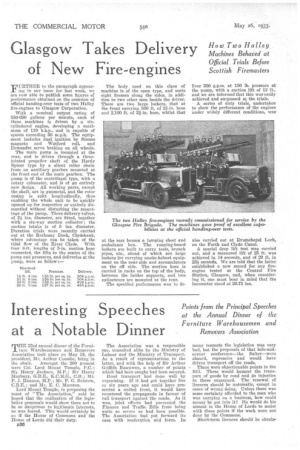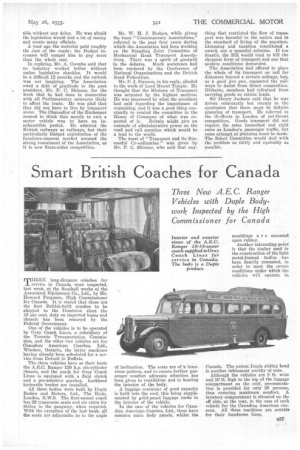Interesting Speeches at a Notable Dinner
Page 50

Page 51

If you've noticed an error in this article please click here to report it so we can fix it.
Points from the Principal Speeches at the Annual Dinner of the Furniture Warehousemen and Removers Association
TEM 33rd annual dinner of the Furniture Warehousemen and Removers Association took place on May 18, the president, Mr. Arthur Coombe, being in
the chair. Amongst the 200 present were Col. Lord Mount Temple, P.C.; Sir Henry Jackson, 141.P. ; Sir Henry Maybury, G.B.E., GB.; Mr. P. S. Hannon, M.P.; Mr. F. G. Bristow, C.B.E. ; and Mr. E. C. Marston.
Lord Mount Temple, in proposing the toast of " The Association," said he hoped that the realization of the legislative proposals would show them not to be so dangerous to legitimate interests, as was feared. This would certainly be s;_f if the House of Commons and the House of Lords did their duty. The Association was a responsible one, consulted alike by the Ministry of Labour and the Ministry of Transport. As a result of representations to the latter, and with the help of Sir Arthur Griffith Boscawen, a number of points which had been sought had been secured.
Road transport had done well by organizing. If it had got together five or six years ago and could have presented a united front, it would have countered the propaganda in favour of rail transport against the roads. As it was, joint efforts had prevented the Finance and Traffic Bills from being Quite so severe as had been possible. The Association had put forward its case with moderation and force. In
many respects the legislation was very bad, but the proposals of that hole-andcorner conference—the Salter—were absurd, repressive and would have driven transport off the roads.
• There were objectionable points in the Bill. These would hamper the transport of goods by road and do injustice to those concerned. The renewal, of licences should be automatic, except in cases of wrong doing. Unless there was some certainty afforded to the man who was carrying on a business, how could money be put into it? He would do his utmost in the House of Lords to assist with these points if the work were not done by the Commons.
Short-term licences should be obtain'
able without any delay. He was afraid the legislation would cost a lot of money and create many officials.
A year ago the motorist paid roughly the cost of the roads; the Budget increases will compel him to pay more than the whole cost.
In replying, Mr. A. Coombe said that no industry worked better without undue legislative shackles. It would he a difficult 12 months and the outlook was not inspiring. The Association owed a debt of gratitude to the past president, Mr. F. C. Skinner, for the work that he had done in connection with all Parliamentary measures likely to affect the trade. He was glad that they did not have to live by transport alone. The Chancellor of the Exchequer seemed to think that merely to own a motor vehicle was to have an inexhaustible pocket. He admired the British railways as railways, but their particularly blatant exploitation of the furniture-removal market aroused the strong resentment of the Association, as it is now State-aided competition. Mr. W. H. J. Hedges, while giving the toast "Contemporary Associations," referred to the past four years during which the Association had been working on the Standing Joint Committee of Mechanical Road Transport Associations, There was a spirit of goodwill in the debates. Much assistance had been rendered by the Conference of National Organizations and the British Road Federation.
Mr. P. J. Hannon, in his reply, alluded to the work of Lord Mount Temple. He thought that the Minister of Transport was actuated by the highest motives. He was impressed by what the president had said regarding the importance of organizing, and it WU a good thing constantly to remind the committee in the House of Commons of what was ex pected of it. Britain might give an example of administrative power on the road and rail question which would be a lead to the world.
The toast of 'Transport and its Successful Co-ordination" was given by Mr. F. C. Skinner, who said that any thing that restricted the flow of transport was harmful to the nation and to the standard of living of the populace. Licensing and taxation constituted a sword, not a peaceful solution. If too drastic, the Bill would tend to kill the cheapest form of transport and one that modern conditions demanded.
The Association had offered to place the whole of its transport on rail for distances beyond a certain mileage, but, as a quid pro quo, requested the railways to desist from direct competition. Hitherto, members had refrained from carrying goods as return loads.
Sir Henry Jackson said that he was driven reluctantly but sternly to the conclusion that there must be definite planning of transport. He referred to the ill-effects in Loudon of cut-throat competition. Goads transport did not require the same iconoclast and rigid rules as London's passenger traffic, but some attempt at planning must be made. The Select Committee would deal with the problem as fairly and equitably as possible.




























































































